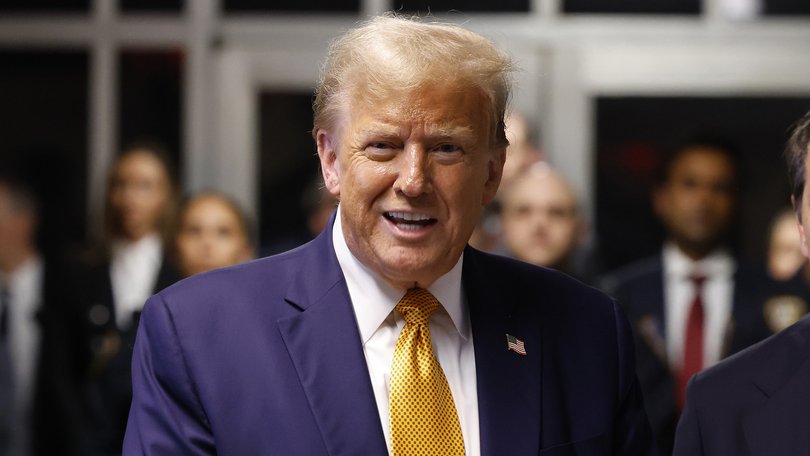The Trump trial jury has begun deliberating. Here’s what happens next

Donald Trump’s New York hush money case is now in the hands of the jury, which will decide whether he will become the first former president convicted of a crime. Here is a primer on how jury deliberations work, along with some questions you might have about this particular case.
What are jury deliberations?
This is the part of the trial in which jurors formally take the case. After testimony and closing arguments conclude, a judge explains the laws to the jury. The jurors then head into the jury room, where they discuss the allegations, examine the evidence and try to reach a verdict.
Sign up to The Nightly's newsletters.
Get the first look at the digital newspaper, curated daily stories and breaking headlines delivered to your inbox.
By continuing you agree to our Terms and Privacy Policy.When will the jury reach a verdict?
Nobody knows. It could take just a few hours. Or it could take them a full day, several days or more than a week. Legal analysts say there is no such thing as a standard period for jurors to deliberate. Once jurors take the case, they will deliberate until they are done.
Juror deliberations are largely a black box, with only the jurors in the room privy to their deliberations. There is one major exception, which we will get into below.
Do jurors ever have any questions?
They do, and this is where the public could get a peek into the deliberations.
Jurors may want to see some evidence again or review testimony from earlier in the trial. They could also have questions about specific parts of the law or the judge’s instructions. In all of those cases, the jury would send a note to the judge, who reopens the courtroom and summons jurors and attorneys back to address the questions.
Whatever the question, that could give some insight into what jurors might be stuck on or what topics could be tripping them up.
Where will Trump be while the jury deliberates?
New York Supreme Court Justice Juan Merchan said Wednesday that Trump and his attorneys would have to remain in the courthouse during deliberations and would be summoned back if jurors send a note. Trump does not have to remain in the courtroom, only in the building.
Is the jury sequestered?
It is not. The jurors’ identities are shielded from the public because of an order from Merchan, though prosecutors and defense attorneys know their names.
There are also six alternate jurors in the case. In New York, once juries begin deliberations, judges can dismiss the alternates as long as both sides of the case agree — or can tell them to hang around as spare jurors in case they are needed. In this case, Merchan told the alternates to stick around.
What happens if jurors cannot agree on the counts?
Jurors need to be unanimous to reach a verdict of guilty or not guilty on each of the 34 counts facing Trump. If they unanimously find him guilty, then he gets convicted on that count; if they unanimously find him not guilty, he gets acquitted on that count.
But jurors don’t always unanimously agree!
If they cannot reach a unanimous verdict, they inform the judge that they are stuck. When that happens in New York — and in many other state courts, as well as federal court — is that judges offer what is known as an Allen, or a dynamite, charge, meant to help them get unstuck.
The judge effectively tells jurors to reexamine their views and change their opinions if they think they are wrong. The judge is also supposed to tell the jurors not to change their views just to reach a verdict. Then the jury gets sent to deliberate some more.
If jurors still cannot all agree, they are deemed a hung jury. If that were to happen, Merchan would declare a mistrial. Prosecutors would then have to decide whether to bring the case again.
Do jurors have to reach the same verdict on all 34 counts?
They do not. It is possible that jurors could find Trump guilty on some counts, but not guilty on others. They could also reach a verdict on some counts and deadlock on others.
Trump faces 34 counts of falsifying business records in the first degree. The indictment essentially breaks down the counts into three types of records, relating to allegedly false invoices, cheques and ledger records kept by the Trump Organization.
If jurors find Trump guilty, do they also decide the sentence?
No, jurors don’t decide a sentence. They are simply tasked with deciding whether Trump is guilty or not guilty of the charges he faces.
If they do find Trump guilty, Merchan will decide the sentence, most likely at a hearing to be held at a later date.
Before such a hearing, the prosecutors, defense and potentially a probation office would tell Merchan what they think the sentence should be.
Such hearings typically come a few weeks or months after a guilty verdict is handed down. Trump is expected to appeal any conviction, which would be a lengthy process.
The felonies Trump is accused of committing could carry a prison sentence, though it is not required. Legal analysts are split on what penalty could get handed down, though they say that Trump’s age, 77, and lack of a prior criminal conviction make a jail sentence unlikely.
Devlin Barrett and Shayna Jacobs in New York contributed to this report.
© 2024 , The Washington Post
